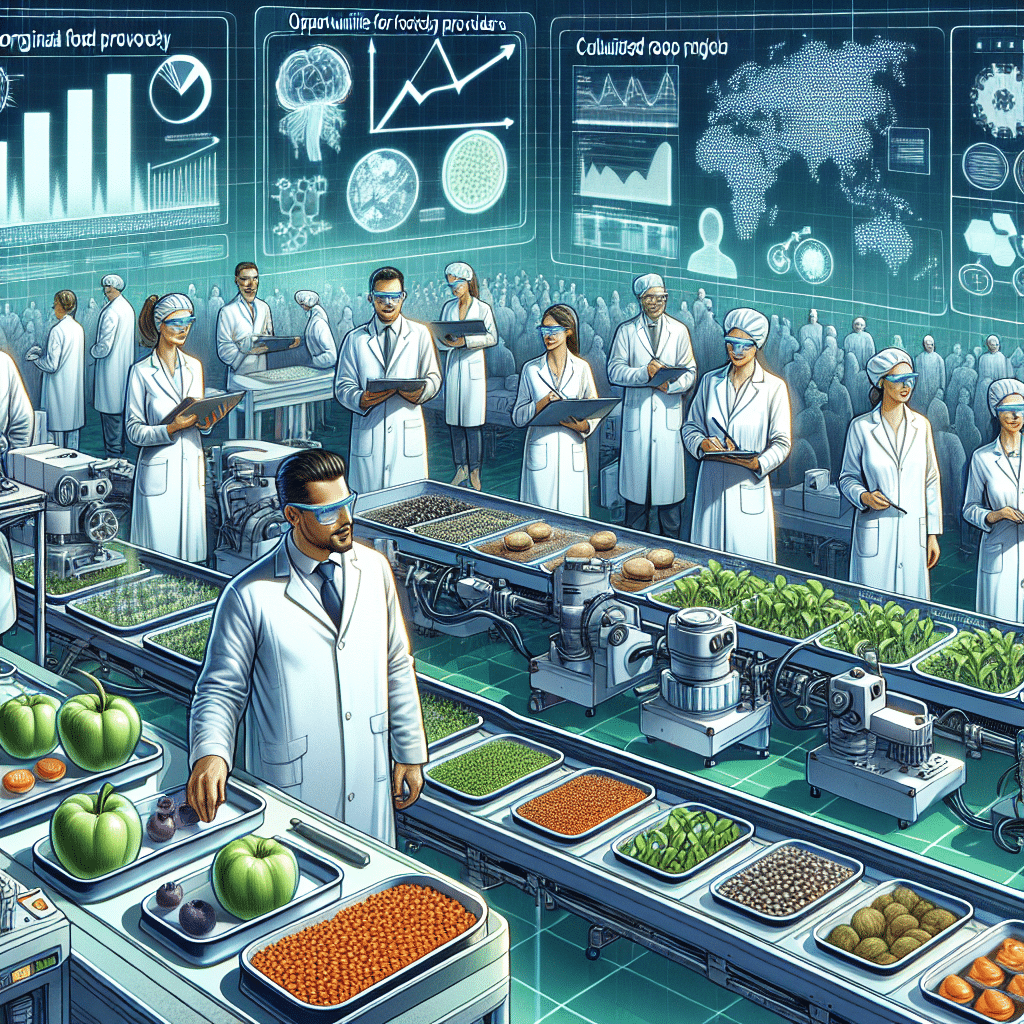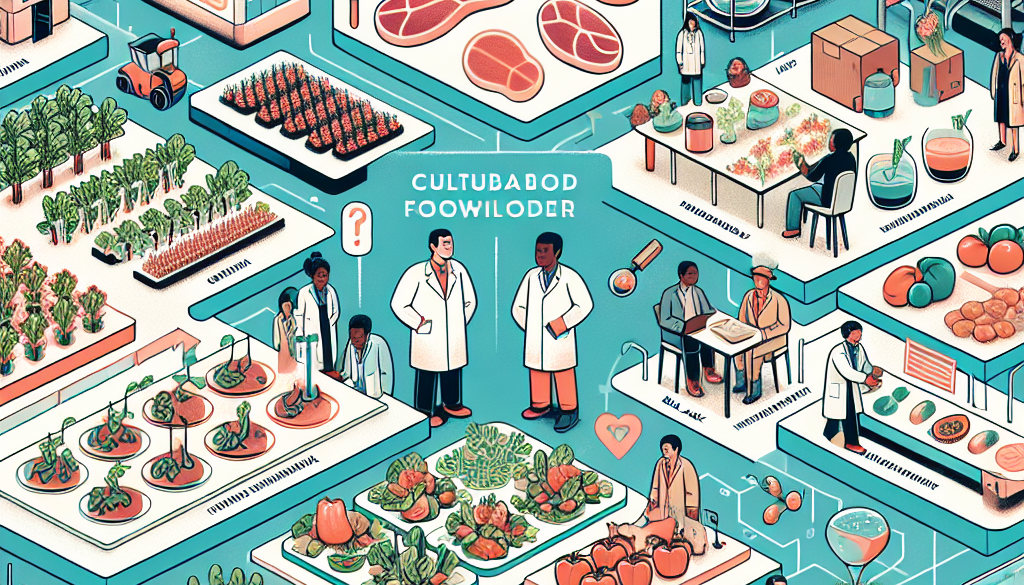Opportunities for food Technology providers in Cultivated food Industry
-
Table of Contents
- Exploring Opportunities for Food Technology Providers in the Cultivated Food Industry
- The Rise of Cultivated Foods
- Market Potential for Cultivated Foods
- Opportunities for Food Technology Providers
- Challenges and Considerations
- Case Studies of Success
- Conclusion: Seizing the Cultivated Food Opportunity
- ETprotein’s Role in the Cultivated Food Industry
Exploring Opportunities for Food Technology Providers in the Cultivated Food Industry

The cultivated food industry, also known as cell-based or lab-grown food, is a rapidly emerging sector that promises to revolutionize the way we produce and consume food. With the global population projected to reach 9.7 billion by 2050, the demand for sustainable and ethical food sources is at an all-time high. This burgeoning industry not only addresses concerns over animal welfare and environmental impact but also presents a plethora of opportunities for food technology providers. In this article, we will delve into the potential that lies within the cultivated food industry for these providers and how they can capitalize on this innovative market.
The Rise of Cultivated Foods
Cultivated foods are produced by cultivating animal cells directly, without the need to raise and slaughter animals. This process involves taking a small sample of cells from an animal and growing them in a controlled environment to produce meat, dairy, or other animal products. The benefits of this approach are manifold, including reduced greenhouse gas emissions, lower water and land usage, and the elimination of antibiotics and hormones often used in traditional animal farming.
Market Potential for Cultivated Foods
According to a report by AT Kearney, by 2040, cultivated meat is expected to claim a substantial share of the global meat market. The cultivated food industry is still in its infancy, but it has already attracted significant investment, with companies like Memphis Meats, Mosa Meat, and BlueNalu leading the way. The market for alternative proteins, which includes plant-based and cultivated meats, could reach $290 billion by 2035, as per a Boston Consulting Group and Blue Horizon Corporation report.
Opportunities for Food Technology Providers
Food technology providers are uniquely positioned to contribute to and benefit from the growth of the cultivated food industry. Here are some key areas where they can make an impact:
- Bioreactor Design and Manufacturing: Cultivated meat production requires bioreactors where cell cultures can grow. There is a need for scalable and efficient bioreactor systems that can support large-scale production.
- Cell Culture Media: The growth medium that feeds the cells is one of the most expensive components of cultivated meat production. Providers can innovate to create cost-effective, high-quality growth media.
- Scaffolding Materials: Scaffolding provides the structure needed for cells to develop into tissues. Food technology providers can develop edible and biodegradable scaffolding materials.
- Sensor Technology: Monitoring cell growth and environmental conditions is crucial. Advanced sensors and control systems will be essential for optimizing production.
- Supply Chain Solutions: As the industry scales, robust supply chains will be necessary. Providers can offer solutions for logistics, packaging, and distribution that maintain the integrity of cultivated products.
- Quality Control and Safety: Ensuring the safety and quality of cultivated foods is paramount. Technology providers can develop testing and quality control systems to meet regulatory standards.
Challenges and Considerations
While the opportunities are vast, there are also challenges that food technology providers must navigate:
- Regulatory Hurdles: The cultivated food industry is subject to strict regulations. Providers must work closely with regulatory bodies to ensure compliance.
- Consumer Acceptance: Educating consumers and gaining their trust is essential for the adoption of cultivated foods.
- Cost Reduction: Bringing down production costs is critical for cultivated foods to compete with traditional animal products.
Case Studies of Success
Several companies have already made significant strides in the cultivated food industry. For instance, Memphis Meats has successfully produced cultured meatballs and chicken, while Perfect Day has developed animal-free dairy proteins using fermentation technology. These successes demonstrate the viability of cultivated foods and the potential for food technology providers to innovate in this space.
Conclusion: Seizing the Cultivated Food Opportunity
The cultivated food industry offers a fertile ground for food technology providers to innovate and grow. By addressing the challenges and leveraging their expertise in biotechnology, engineering, and supply chain management, these providers can play a pivotal role in shaping a sustainable and ethical future for food production. The key takeaways for food technology providers are to focus on scalability, cost reduction, and consumer education to fully capitalize on the opportunities presented by the cultivated food industry.
ETprotein’s Role in the Cultivated Food Industry
ETprotein is well-positioned to support the cultivated food industry with its high-quality protein products. Their offerings, such as organic rice protein, pea protein, and various seed proteins, can serve as essential ingredients for companies developing plant-based and cultivated food products. ETprotein’s commitment to non-GMO, allergen-free, and high-purity proteins ensures that their clients receive the best possible components for their innovative food solutions.
About ETprotein:
ETprotein, a reputable protein and L-(+)-Ergothioneine (EGT) Chinese factory manufacturer and supplier, is renowned for producing, stocking, exporting, and delivering the highest quality organic bulk vegan proteins and L-(+)-Ergothioneine. They include Organic rice protein, clear rice protein, pea protein, clear pea protein, watermelon seed protein, pumpkin seed protein, sunflower seed protein, mung bean protein, peanut protein, and L-(+)-Ergothioneine EGT Pharmaceutical grade, L-(+)-Ergothioneine EGT food grade, L-(+)-Ergothioneine EGT cosmetic grade, L-(+)-Ergothioneine EGT reference grade and L-(+)-Ergothioneine EGT standard. Their offerings, characterized by a neutral taste, non-GMO, allergen-free attributes, with L-(+)-Ergothioneine purity over 98%, 99%, cater to a diverse range of industries. They serve nutraceutical, pharmaceutical, cosmeceutical, veterinary, as well as food and beverage finished product distributors, traders, and manufacturers across Europe, USA, Canada, Australia, Thailand, Japan, Korea, Brazil, and Chile, among others.
ETprotein specialization includes exporting and delivering tailor-made protein powder and finished nutritional supplements. Their extensive product range covers sectors like Food and Beverage, Sports Nutrition, Weight Management, Dietary Supplements, Health and Wellness Products, and Infant Formula, ensuring comprehensive solutions to meet all your protein needs.
As a trusted company by leading global food and beverage brands and Fortune 500 companies, ETprotein reinforces China’s reputation in the global arena. For more information or to sample their products, please contact them and email sales(at)ETprotein.com today.












